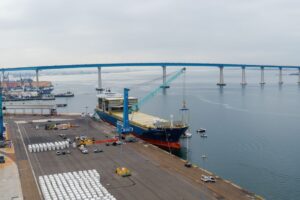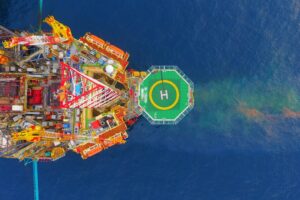TotalEnergies has long played a valuable role across the African energy sector, with operations spanning the whole value chain of oil and gas development. TotalEnergies has been serving the Nigerian hydrocarbon sector for over a century, working alongside the Government of Nigeria, as well as various private companies and associations across the country. With a wealth of oil deposits across the country, Nigeria today is one of the largest oil producers in Africa and so contributes significantly to TotalEnergies’ total hydrocarbon production. Today, the bulk of TotalEnergies’ operations centres around upstream exploration and production, through its subsidiary TotalEnergies EP Nigeria Limited (TEPNG). Across TEPNG’s operations, the company is committed to delivering vital oil resources while working with local communities to deliver socio-economic development for the country.
Check out the article in the magazine below:
Since 1962, TEPNG has been leading the exploration and production of Nigeria’s upstream sector. Working alongside the Nigerian Government, the Nigerian National Petroleum Corporation (NNPC) and several indigenous companies, TEPNG is set on developing the country’s hydrocarbon industry. Today, TEPNG holds a 40% interest in the NNPC/TEPNG Joint Venture, which has been producing oil and natural gas from multiple onshore and shallow water concessions across the country. Many of these ventures span the West Delta Basin, a prolific hydrocarbon province, delivering significant oil and gas resources for the country.
One of the most significant oil fields offshore Nigeria is the Egina field (OML 130), which was first discovered in 2003. The oil field, located 150km off the Nigerian coast, is located at depths of 1,400-1,700m and is owned in partnership between TEPNG as the operator, and NNPC, CNNOC, SAPETRO and Prime 130. The Egina field encompasses 44 subsea wells, which are connected to a Floating Production Storage and Offloading (FPSO) vessel, which has the capacity to hold up to 2.3 million barrels of oil. The FPSO is one of the largest of its type built by TotalEnergies and helps the field to produce 200,000 barrels of oil per day, accounting for close to 10% of Nigeria’s total oil production.
Over the years, the Egina field has seen vital infrastructural developments under TEPNG to help it continue to meet oil and gas demands. However, one of the most exciting developments for Egina was announced in 2019 when the oil field achieved net-zero routine flaring across the development. The field was able to achieve this thanks to the gas compression system installed at the field, which allowed it to become the first oil project in Nigeria to reach this milestone of zero routine flaring. This significant step highlights TotalEnergies’ commitment to cutting emissions to deliver a more sustainable energy sector. In fact, Nigeria was one of the first countries where TotalEnergies led projects to detect and measure the methane emissions of its oil and gas facilities, utilising its cutting-edge AUSEA technology. This technology, made available through NNPC through a corporation agreement in 2023, ensures that TEPNG can routinely monitor the emissions from its projects to help mitigate and limit the impact of its operations on global warming.
A key example of TotalEnergies’ focus on delivering projects with low emissions was seen when TEPNG announced that it had begun production at the Akpo West site within the PML2 license. Akpo was the first deep offshore project operated by TEPNG in Nigeria, and when it began production in 2009, it had a production plateau of 180,000 barrels of condensate per day with a storage capacity of 2 million barrels of stabilised liquid hydrocarbon. However, in 2024, new developments began across the Akpo field, with the Akpo West deposit being tied back to the existing Akpo FPSO facility. The integration of Akpo West into the existing facilities added 14,000 barrels of condensate production per day and is expected to see up to 4 million cubic metres of gas per day by 2028. By leveraging the development with the existing infrastructure, TEPNG is able to keep costs low and, in the process, limit its emissions. This development highlights that by working with CNOOC (45% interest), Sapetro (15%), Prime 130 (16%) and the Nigerian National Petroleum Company Ltd on the PML2 project, TotalEnergies (24%) is utilising the expertise and experience of the partnership to bring key condensate production to Nigeria, whilst working towards its strategy to deliver low emission and low cost operations that can deliver significant gas potential to the region in the process.
Another key license for TEPNG is the OML 58 license, a mature onshore field located in the Niger Delta. The field has a production capacity of 60,000 barrels of oil per day. TEPNG operates the OML58 onshore licence with a 40% interest and is developed under the Ubeta Gas Development in partnership with NNPC, who hold a 60% interest. Estimated to be a $550 million investment, the development is set to begin production in 2027 and is designed to deliver a production lifespan of 20 years. The Ubeta Gas Field development project will see engineering design, construction, drilling, and commissioning of a six-well gas production cluster; the Ubeta Production Cluster (UPC). The project will deliver a stable gas supply for the operations of Nigeria Liquefied Natural Gas, a liquefied natural gas facility situated on Bonny Island, which is undergoing an expansion to increase its capacity from 22 to 30 million tonnes per annum. The drilling campaign is expected to span 1.5 years and is expected to begin operations in the second quarter of 2026, with a single rig deployed to develop the 6 wells.
As TotalEnergies expands its portfolio across Nigeria, the company announced in September that it had been awarded Two Offshore Exploration Permits following the 2024 Exploration Round, as organised by the Nigerian Upstream Petroleum Regulatory Commission. TotalEnergies will hold an 80% ownership of the PPL 200 and PPL2001 exploration licences, in partnership with South Atlantic Petroleum, which will hold a 20% ownership. Development across the licenses, which sit within the West Delta Basin, includes a drilling program for one exploration well. Announcing the awarding of the permit, Kevin McLachlan, Senior Vice-President of Exploration at TotalEnergies, outlines that “TotalEnergies is honoured to be the first international company to be awarded exploration licences in a bid round in Nigeria in more than a decade, marking a new milestone in our long-term partnership with the country”. McLachlan continues, “These promising block captures are fully aligned with our strategy of strengthening our Exploration portfolio with drill-ready and high-impact prospects, that have the potential for low-cost and low-emissions development from new discoveries in our core areas of expertise”.
McLachlan’s comments highlight the valuable and future-focused developments that TotalEnergies, and especially TEPNG, is all about. TPENG is committed to delivering vital energy resources in a low-cost and low-emissions way that will enhance Nigeria’s energy sector and leverage its expertise in the offshore sector to deliver significant benefits for the country in the process. By doing so, TEPNG can strengthen its role across Nigeria’s energy sector, and in the process highlighting its role as a leading energy company operating across Africa.
This announcement follows TotalEnergies’ divestment of its non-operated assets in the Bonga Field in May 2025. The agreement outlines that TotalEnergies would sell its 12.5% non-operated interest in the field to Shell Nigeria Exploration and Production Company Ltd. (SNEPCo) for $510 million. The OML 118 license is currently operated with a 55% interest, in partnership with Esso Exploration and Production Nigeria (20%), TEPNG (12.5%) and Nigerian Agip Exploration (12.5%). The Bonga Field, located within the Niger Delta, began production in 2005 and has seen significant development within the Bonga North field in 2024. The agreement for TotalEnergies to divest its non-operated assets in the field was commented on by Nicolas Terras, President of Exploration and Production at TotalEnergies, who said, “TotalEnergies continues to actively high-grade its Upstream portfolio, to focus on assets with low technical costs and low emissions, and to lower its cash breakeven”. Terras continues, “In Nigeria, the Company is focused on its operated gas and offshore oil assets and is currently progressing the development of the Ubeta project, designed to sustain gas supply to Nigeria LNG”. Terras’ comments highlight TotalEnergies’ vital move to solidify its place within Nigeria’s energy sector by focusing on its operated assets and sustainable energy delivery options for the future of the country’s energy development.
Across TEPNG’s operation in Nigeria, there is a keen focus on developing vital oil and gas deposits that can develop alongside existing infrastructure to keep costs low. However, one of the key aspects of all of its developments is delivering its projects with low emissions in mind, to protect the sector both now and for the future. With the recent expansion of TotalEnergies’ role across Nigeria, the company continues to solidify its place as a leader in Nigeria’s energy sector, set on delivering vital hydrocarbons for the future, whilst protecting the people and planet of today.








